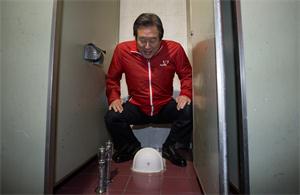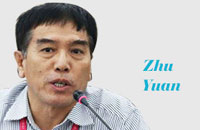Abe shows he has no desire to mend fences
(China Daily) Updated: 2015-08-25 08:10
 |
|
Japan's Prime Minister Shinzo Abe attends a news conference to deliver a statement marking the 70th anniversary of World War Two's end, at his official residence in Tokyo August 14, 2015. [Photo/Agencies] |
It is finally confirmed:
Japanese Prime Minister Shinzo Abe is not attending the commemoration activities to mark the 70th anniversary of the end of World War II in Beijing on Sept 3. Nor will he visit China around that sensitive date.
This does not sound good to those who regard Abe's presence as symbolic of much-needed reconciliation in East Asia.
Which is why, despite all their discontent about Tokyo's capriciousness and double-dealing, both Beijing and Seoul have left the door to reconciliation wide open.
Which is why, in spite of all the tensions that have accumulated and kept accumulating, many retained the naive hope that Abe would avail himself of this historic opportunity to make peace with Japan's neighbors even after his Aug 14 speech.
Indeed, a sincere apology of his own that day might have resulted in an immediate thaw in the long-strained ties. Yet Abe slammed that door shut. That speech of Abe was a blunt declaration that he and his Cabinet have little interest in mending fences.
Abe's eventual decision to avoid visiting Beijing at this point reinforces that.
He only may have saved both his host and himself the awkwardness of staged bonhommie. And he will be able to preserve his unapologetic image before his home audience, while his Chinese hosts will escape the embarrassment of standing side by side with the unrepentant leader of the country's past victimizer.
Sino-Japanese relations have soured to such an extent that they will not get any worse no matter how Abe's absence is explained and construed. His presence could make everyone uncomfortable. That may explain why Beijing has insisted the invitation it had extended to Abe was for the commemorations only, not for an official visit as some expected.
Although Abe's Aug 14 speech effectively ruled out a coveted summit meeting with Chinese President Xi Jinping, the Japanese government has again stated it will continue to seek such an opportunity through such international occasions as the United National General Assembly next month.
The two leaders do have plenty to deal with together, if they can finally sit down and talk face to face. But a meaningful summit meeting entails an atmosphere of proper mutual trust, which is obviously absent now.
A summit meeting for a summit meeting's sake would not repair the serious damage Abe has done to the bilateral ties. So neither side should place too much hope on it, even if it does happen some other day.











